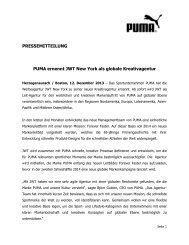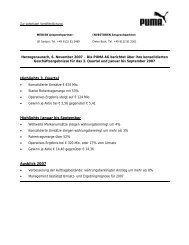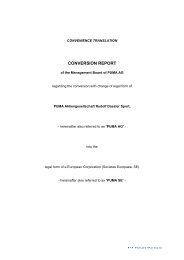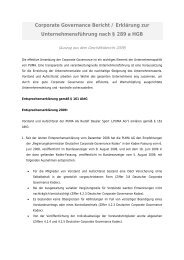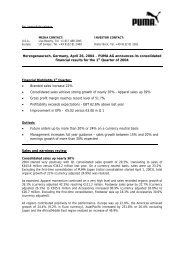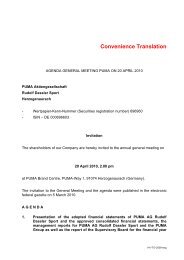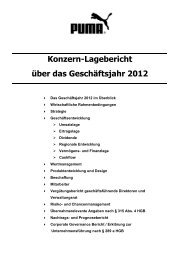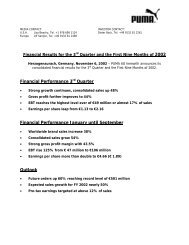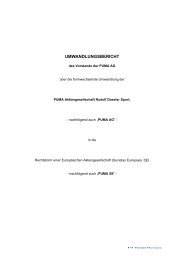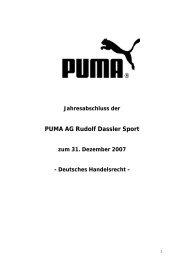PUMA.Safe Environmental Handbook Volume 1 - About PUMA
PUMA.Safe Environmental Handbook Volume 1 - About PUMA
PUMA.Safe Environmental Handbook Volume 1 - About PUMA
Create successful ePaper yourself
Turn your PDF publications into a flip-book with our unique Google optimized e-Paper software.
SECTION THREE<br />
3. Environment Management Systems (EMS)<br />
<strong>Environmental</strong> Management Systems (EMS) are an important vehicle for improving environmental performance by<br />
providing various types of organizations with the necessary tools to successfully manage their environmental activities<br />
and initiatives.<br />
3.1 Legal Compliance<br />
Full Legal Compliance forms the basis of every EMS. In most countries, official permits are necessary as proof of<br />
compliance with legal requirements. For different production processes, different permits may be required, for example<br />
a discharge permit for dye houses or an air emission permit for factories which operate a large scale boiler or electric<br />
power generator. Thus it depends on the type and size of production which requirements must be complied with.<br />
Typically, permits cover air emissions, effluents and legal waste disposal, which apply for both normal and hazardous<br />
waste. The following permitting documents must be secured by <strong>PUMA</strong> entities and supplier factories where applicable<br />
and as required by local laws:<br />
• <strong>Environmental</strong> Impact Assessment (EIA)<br />
• Environment Compliance Certificate (or its exemption) as justified by the EIA<br />
• Related Permit to Operate a Business following clearance of complying with relevant Environment Protection<br />
and Pollution regulations.<br />
• Environment Permit to Operate Wastewater Treatment facilities<br />
• Environment Permit to Air Emission Sources (e.g. Boilers, Power Generators, Dust Collector, Onsite Incinerator,<br />
etc.),<br />
• Environment Permit or Clearance for Transport and Disposal of Solid Waste<br />
• Environment Permit for Storage, Transport and Disposal of Hazardous Waste<br />
• Other Environment Permit required by National <strong>Environmental</strong> Laws<br />
The <strong>PUMA</strong>.<strong>Safe</strong> team expects suppliers to keep up to date with all relevant environmental legislation and act accordingly.<br />
To ensure that a factory is in compliance with the local legislation and in accordance with the <strong>PUMA</strong>.<strong>Safe</strong> standards, an<br />
inspection of written environmental permits forms part of the <strong>PUMA</strong>.<strong>Safe</strong> Audit, which is a precondition for every<br />
supplier’s production authorization.<br />
3.2 Plan-Do-Check-Act<br />
Besides <strong>PUMA</strong>s own operations, all <strong>PUMA</strong> suppliers shall implement a sound <strong>Environmental</strong> Management System to<br />
ensure legal compliance, effective implementation of an environmental program as well as to achieve continuous<br />
improvement. In this regard, <strong>PUMA</strong> encourages suppliers to secure a certified EMS program like ISO 14001 and/or the<br />
EU Eco-Management and Audit Scheme EMAS.<br />
For more information on the above certified EMS programs:<br />
http://www.iso.org/iso/iso14000<br />
http://ec.europa.eu/environment/emas/index_en.htm<br />
12



